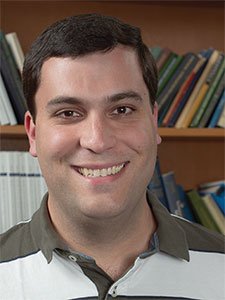University of Minnesota physics assistant professor receives Department of Energy honor

Contact:
Rhonda Zurn, College of Science and Engineering, rzurn@umn.edu, (612) 626-7959
Early Career Research Program provides support to exceptional researchers
MINNEAPOLIS/ST. PAUL (05/07/2014) – University of Minnesota physics and astronomy assistant professor Rafael Fernandes is one of only 35 scientists from across the nation selected by the Department of Energy’s (DOE’s) Office of Science to receive significant funding for research as part of DOE’s Early Career Research Program.
Fernandes received his Ph.D. in physics from State University of Campinas in Brazil in 2008 and joined the University of Minnesota as an assistant professor in 2012. Before coming to Minnesota, he was a postdoctoral researcher at Ames Laboratory and a joint postdoctoral research at Columbia University/Los Alamos National Lab. His main research activities are in theoretical condensed matter physics.
The DOE’s Early Career Research Program, now in its fifth year, is designed to bolster the nation’s scientific workforce by providing support to exceptional researchers during the crucial early career years, when many scientists do their most formative work.
Under the program, university-based researchers will receive at least $150,000 per year to cover summer salary and research expenses. The research grants are planned for five years.
“By supporting our most creative and productive researchers early in their careers, this program is helping to build and sustain America’s scientific workforce,” said Patricia M. Dehmer, acting director of DOE's Office of Science. “We congratulate this year’s winners on having competed successfully for these highly selective awards, and we look forward to following their accomplishments over the next five years.”
To be eligible for the DOE award, a researcher must be an untenured, tenure-track assistant or associate professor at a U.S. academic institution or a full-time employee at a DOE national laboratory, who received a Ph.D. within the past 10 years. Research topics are required to fall within one of the Department's Office of Science's six major program offices:
- Advanced Scientific Computing Research
- Basic Energy Sciences
- Biological and Environmental Research
- Fusion Energy Sciences
- High Energy Physics
- Nuclear Physics
Awardees were selected from a large pool of university- and national laboratory-based applicants. Selection was based on peer review by outside scientific experts.
A list of all 35 awardees, their institutions, and titles of research projects is available on the Early Career Research Program webpage http://science.energy.gov/early-career/.
